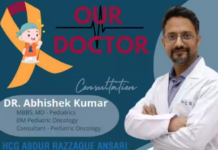Bangalore, March 06, 2020: In yet another brilliant medical and philanthropical initiative to help children suffering from life-threatening medical conditions, Aster CMI Hospital has helped one-year-old infant, recover successfully from a rare kind of serious autoimmune disease described as systemic lupus erythematosus (SLE), commonly known by the name lupus. Aarush (name changed) was suffering from SLE, an inflammatory disease caused when the immune system attacks its own healthy tissues. The debilitating disease got compounded with the aggravation of infections spreading all over his body putting his life at risk. This is when Aster CMI hospital decided to intervene medically and financially aid the child’s treatment through the Aster Sick Kids Foundation as part of its CSR initiative.
Aarush was unwell for over six months and had been suffering from repeated fevers, skin rashes and ulcers in the mouth. He was diagnosed to have SLE at 11 months of age and was started on an appropriate therapy, steroids and other immune modulators by doctors at Aster CMI hospital. SLE had resulted in a weaker immune system for the child and caused serious infection to his body parts. At 12 months of age, there was an unusual collection of pus on his left cheek spreading down till the neck, which worsened the situation. The infant needed an urgent surgery to remove pus from the body, without which the baby’s condition could have turned fatal. He was treated with intravenous antibiotics after draining out the pus. The baby was operated on within 24 hours and after successful recovery, was discharged after four days.
Initially, the baby’s family was shocked by the medical condition of their child and approached another hospital where experts there referred the family to Aster CMI’s Pediatric Rheumatology department for treatment of SLE. The family however could not financially afford further medical treatment. This is when Aster CMI decided to help the patient through its CSR initiative. Post-treatment, the boy recovered and at present is doing fine and is on regular medications. Doctors have advised three-monthly follow-up OPD visits, consumption of healthy food, clean water and a healthy lifestyle.
SLE is a chronic disease with a phase of worsening symptoms that can alternate with periods of mild symptoms affecting any body part. Proper treatment of the SLE disease can increase life expectancy and bring back normalcy to a patient’s life. If the patient fails to undergo the appropriate treatment for the illness with no evaluation under the best conditions, the disease turns fatal. SLE is observed commonly in children from the age group of 10-18 years. It is very uncommon to see SLE in children below the age of 5 and less than 1% cases of SLE occurs at this young age, making this condition even more rare. SLE at such a young age is usually more severe with increased risk for infections. Children would need medications for several years post-treatment.
Dr. Sagar Bhattad, Pediatric Immunologist and Rheumatologist, Aster CMI hospital said: “SLE is an autoimmune disease and has no cure till date, but there are many treatments for the disease. The aim of the treatment is to get the disease into remission and prevent future flares, thus offering a near-normal life to these patients. SLE treatment includes corticosteroids and other forms of immune modulators. Though more common in young females due to hormonal factors, 20% of the cases are reported to occur in childhood. Childhood SLE is much more severe compared to that in adults and needs proper treatment and regular follow-ups. Initial symptoms and signs of SLE can be vague. Children with regular fevers, generalized aches and pains, joint pains and rashes should be taken to the consultant. It is not unusual for them to seek opinions from multiple doctors before an appropriate diagnosis is made and they may suffer for several months in this process. However, if treated appropriately, such children grow into adults and lead a normal life. They can marry and have families just like any other normal individual.”
Corporate Comm India(CCI Newswire)





















